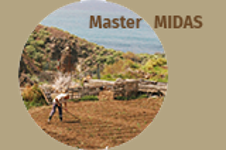Training structure
CIHEAM IAM Montpellier - Partner Institution
Presentation
 The MIDAS course follows on from intensive training provided since 2010 by CIHEAM-IAMM in partnership with several Mediterranean agricultural research and teaching institutes and with the global FSD (Farming System Design) network. More than 300 international participants have been trained in this context. Until now, these intensive courses have been designed to train young scientists in the analysis and evaluation of the sustainability of agricultural systems using integrated approaches. The originality of the MIDAS program, which will draw on several teaching aids and the network of researchers mobilized as part of the intensive training courses, will be to evolve to address issues related to the design of agricultural systems based on food and climate change challenges and to give prominence to the role of diversity (in terms of cropping systems, farms, and actors in the field) in improving the resilience of these systems' food-producing function in the face of climate change and market uncertainties.
The MIDAS course follows on from intensive training provided since 2010 by CIHEAM-IAMM in partnership with several Mediterranean agricultural research and teaching institutes and with the global FSD (Farming System Design) network. More than 300 international participants have been trained in this context. Until now, these intensive courses have been designed to train young scientists in the analysis and evaluation of the sustainability of agricultural systems using integrated approaches. The originality of the MIDAS program, which will draw on several teaching aids and the network of researchers mobilized as part of the intensive training courses, will be to evolve to address issues related to the design of agricultural systems based on food and climate change challenges and to give prominence to the role of diversity (in terms of cropping systems, farms, and actors in the field) in improving the resilience of these systems' food-producing function in the face of climate change and market uncertainties.
Objectives
The aim of this course is to train students for careers in agricultural development engineering as project managers, development project or program managers in national or international organizations, research officers working for local authorities or extension services, etc. It also aims to train engineers to join international centers and institutes such as the FAO or ICARDA. The program's highly methodological approach to the design of innovative agricultural systems and its partnerships with several research laboratories will encourage the development of doctoral theses related to the themes proposed within the framework of this program. >> Learn more
Know-how and skills
In this context, this course will enable students to acquire three types of complementary skills:
• Knowledge: designing more resilient agricultural systems in the Mediterranean that make better use of natural resources and meet growing food needs. In particular, this course will enable students to communicate more effectively with decision-makers at the regional level in order to reflect on the levers that enable better integration of climate and market components in the development of agricultural production strategies based on agroecological practices.
• Know-how: knowing how to work, using participatory approaches, at the interface between different disciplines to design resilient agricultural systems. Also learn how to use multi-criteria and multi-scale analyses in systems approaches. Finally, learn how to develop and use conceptual and digital models to design innovative agricultural systems in the form of scenarios, taking into account climate and market uncertainties.
• Interpersonal skills: working and communicating in a multidisciplinary and multicultural team, developing analytical rigor and a sense of responsibility, being autonomous and proactive. >> Learn more


